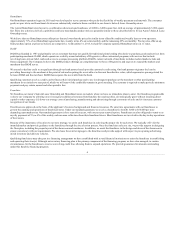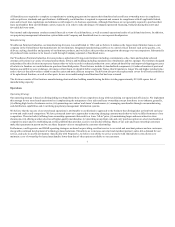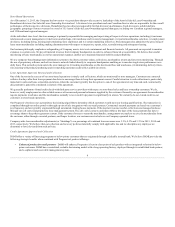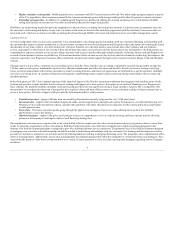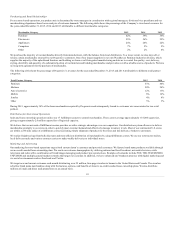Aarons 2015 Annual Report Download - page 17
Download and view the complete annual report
Please find page 17 of the 2015 Aarons annual report below. You can navigate through the pages in the report by either clicking on the pages listed below, or by using the keyword search tool below to find specific information within the annual report.
Our traditional lease-to-own store-based ("core") business faces a number of challenges, particularly from the continued expansion of digital retail - which
includes a wide array of e-commerce retailers that have established far larger digital operations than our Aarons.com e-commerce platform has been able to
achieve to date. Increasing competition from the digital sector may reduce the market share held by our core business as well as its operating margins, and
may materially and adversely affect our overall results of operations. Furthermore, as our Progressive virtual lease-to-own solution continues to partner with
traditional retailers, including "big box" retailers, those retailers may increasingly compete with our core business, including our franchisees. For example,
our Company-operated stores experienced year to date same store revenue declines of 4.1% and 2.8% in 2015 and 2014, respectively. Additionally, our
franchised stores experienced year to date same store revenue declines of 0.9% and 2.5% in 2015 and 2014, respectively. We calculate same store revenue
growth by comparing revenues for comparable periods for stores open during the entirety of those periods. A number of factors have historically affected our
same store revenues, including:
• changes in competition, particularly from the digital sector;
• general economic conditions;
• new product introductions;
• consumer trends;
• changes in our merchandise mix;
• timing of promotional events; and
• our ability to execute our business strategy effectively.
If our core business is unable to successfully address these challenges, our overall business and results of operations may be materially and adversely affected
as well.
The U.S. economy continues to experience prolonged uncertainty. We believe that the extended duration of current economic conditions, particularly as they
apply to our customer base, may be resulting in our customers curtailing entering into sales and lease ownership agreements for the types of merchandise we
offer, resulting in decreased revenues. Any increases in unemployment may result in increased defaults on lease payments, resulting in increased merchandise
return costs and merchandise losses.
The concentration of our Sales & Lease Ownership stores, and/or those of our retail partners at Progressive, in one region or a limited number of markets may
expose us to risks of adverse economic developments that are greater than if our store portfolio and retail partners were more geographically diverse. For
example, during 2015, approximately 18% of our core business’s store-based revenues were generated in Texas. Given our concentration of stores in Texas,
the downturn and prolonged uncertainty in the oil and gas industry could have a material adverse effect on our overall business.
In addition, our store operations, as well as those of our retail partners at Progressive, are subject to the effects of adverse acts of nature, such as winter storms,
hurricanes, hail storms, strong winds, earthquakes and tornados, which have in the past caused damage such as flooding and other damage to our stores and
those of our retail partners in specific geographic locations. Additionally, we cannot assure you that the amount of our hurricane, windstorm, earthquake,
flood, business interruption or other casualty insurance we maintain from time to time would entirely cover damages caused by any such event.
We are heavily dependent on data provided by third party providers. For example, our Progressive business employs a proprietary decisioning algorithm
when making lease approval decisions for its customers. This algorithm depends extensively upon continued access to and receipt of data from external
sources, such as third party data vendors. In addition, our Aarons.com and DAMI businesses are similarly dependent on customer attribute data provided by
external sources. Our data providers could stop providing data, provide untimely, incorrect or incomplete data, or increase the costs for their data for a variety
of reasons, including a perception that our systems are insecure as a result of a data security breach, regulatory concerns or for competitive reasons. We could
also become subject to increased legislative, regulatory or judicial restrictions or mandates on the collection, disclosure or use of such data, in particular if
such data is not collected by our providers in a way that allows us to legally use the data. If we were to lose access to this external data or if our access or use
were restricted or were to
16


